Government’s plans to boost the economy
Government’s plans to boost the economy JoyProgramme of Action
President Jacob Zuma has expressed concern over electricity shortages and challenges facing the mining sector in South Africa, but remains positive that the country’s economy will grow steadily to at least 3 per cent over the next three years.
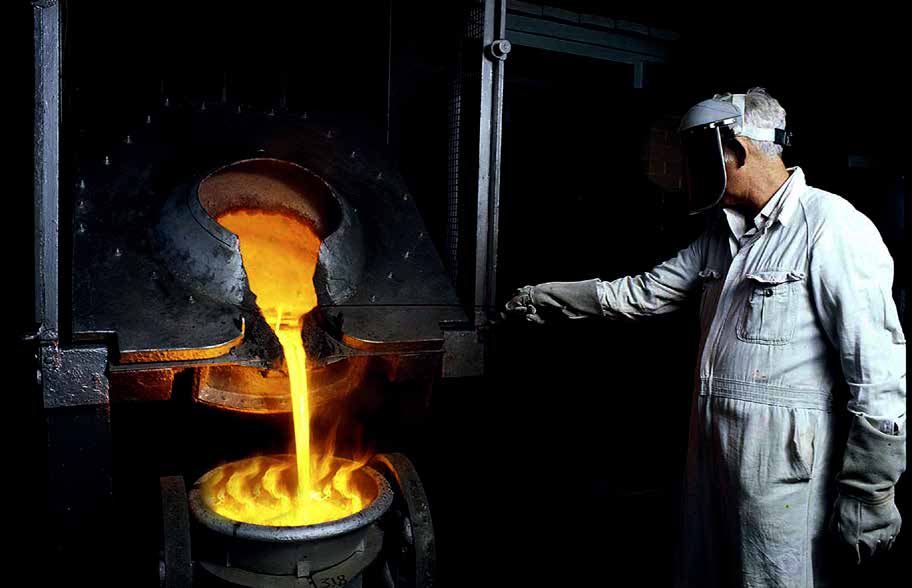 Recently, the President updated the country on government’s progress in implementing its Programme of Action (PoA) in the first year of the Medium Term Strategic Framework (MTSF), as outlined in his State of the Nation Address (SONA) in February.
Recently, the President updated the country on government’s progress in implementing its Programme of Action (PoA) in the first year of the Medium Term Strategic Framework (MTSF), as outlined in his State of the Nation Address (SONA) in February.
The PoA is government’s major plans for the year ahead as announced in the SONA.
The MTSF is government’s strategic plan for the 2014-2019 electoral term. It reflects the commitments made in the election manifesto of the governing party, including the commitment to implement the National Development Plan. The MTSF sets out the actions that government will take and targets to be achieved.
The MTSF also provides a framework for the other plans of national, provincial and local government.
A 3 per cent economic growth is expected despite the slow economic growth globally, as government expects the electricity constraint to ease.
“Our estimate is that electricity shortages are currently costing the economy close to one percentage point in economic growth,” noted the President.
However, he said substantial progress had been made in resolving the energy challenge in the country since the inception of the five-point plan in December 2014.
The five-point plan was adopted by Cabinet to address electricity challenges.
“The operations and maintenance practices at Eskom continue to improve, to ensure that the power plants are appropriately maintained and provide electricity within their capacity.
“Eskom has signed Short-Term Power Purchase (STPP) Agreements that bring additional supply of electricity, to cater for the shortfall due to maintenance and to match demand during peak periods. A further 800 megawatts will be added to the grid through co-generation,” said President Zuma.
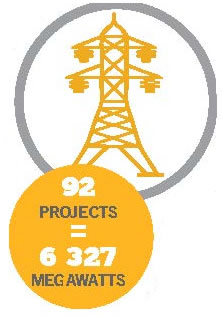 He added that a saving of 450 megawatts had been realised through the energy efficiency programmes.
He added that a saving of 450 megawatts had been realised through the energy efficiency programmes.
President Zuma said various projects of the Renewable Energy Independent Power Producer Programme (REIPPP) currently supplies 1 800 megawatts to the grid.
“Within the next two and a half years, the 92 projects of the renewable energy programme will bring a total of 6 327 megawatts to the grid.”
The exploration of other options for electricity generation is underway, including cross-border projects within the Southern African Development Community (SADC) region that include hydro, gas and coal.
For the medium to long-term electricity supply, the President said the nuclear build programme was at an advanced stage of planning, and the procurement should be concluded within the current financial year.
He said the updated Gas Utilisation Master Plan, which would stimulate development and investment in the gas industry, would be published
The President added that the South African economy, as with many economies in the world, continued to struggle to fully regain its pre-financial crisis growth momentum.
“We committed ourselves to a 5 per cent growth rate by 2019. The 1.5 per cent economic growth rate attained in 2014, is a distance from that NDP ambition,” he said.
To address this, the government developed the Nine Point Plan, announced in February, to look for growth opportunities. The plan includes:
- Revitalisation of the agriculture and agro-processing value-chain.
- Advancing beneficiation (adding value to our mineral wealth).
- More effective implementation of a higher impact Industrial Policy Action Plan.
- Unlocking the potential of SMME, cooperatives as well as township and rural
- enterprises.
- Resolving the energy challenge.
- Stabilising the labour market.
- Scaling-up private-sector investment.
- Growing the ocean economy.
- Cross-cutting areas to reform, boost and diversify the economy such as the following:
- Science, technology and innovation
- Water and sanitation
- Transport infrastructure
- Broadband rollout
- State-owned companies
Youth empowerment
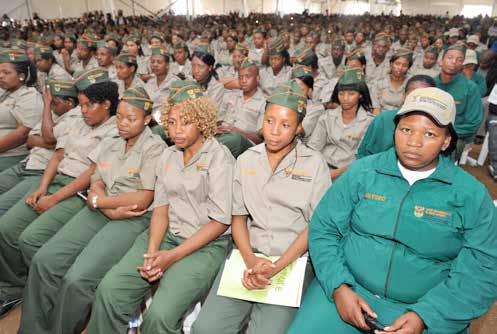 In May this year, Cabinet adopted the National Youth Policy. The Presidential Youth Working Group has been established, made up of youth formations and government. Led by the Deputy Minister for Planning, Monitoring and Evaluation, Buti Manamela, the Working Group helps to coordinate the implementation of the youth policy.
In May this year, Cabinet adopted the National Youth Policy. The Presidential Youth Working Group has been established, made up of youth formations and government. Led by the Deputy Minister for Planning, Monitoring and Evaluation, Buti Manamela, the Working Group helps to coordinate the implementation of the youth policy.
The programmes being implemented include:
- Youth entrepreneurship and cooperatives training and mentorship.
- Reform and review of the National Students Financial Aid Scheme.
- To increase enrolments in universities and vocational training colleges.
- Implementing youth employment programmes such as the installation of solar water geyser and set top boxes.
- Implementation of public employment programmes and fostering values for the formation of an ideal citizen.
Mining
The President said government was concerned about the threat of job losses in the mining and steel sectors particularly because job losses would have a negative impact on many families, communities and the economy.
He said mining remained an important component of the South African economy and government wanted it to remain the backbone of the country’s economy.
His comments follow recent announcements by several mining companies of their intention to retrench workers.
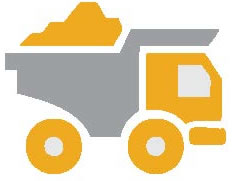 To address this, the Minister of Mineral Resources Ngoako Ramatlhodi convened a retreat of tripartite stakeholders in the mining sector recently.
To address this, the Minister of Mineral Resources Ngoako Ramatlhodi convened a retreat of tripartite stakeholders in the mining sector recently.
Stakeholders identified a number of areas to save jobs and to find alternatives to job losses. A task team was established and has been asked to develop detailed proposals.
The Presidential Business Working Group (PBWG), which was convened few days before the President gave the SONA update, mandated government and the Chamber of Mines to seek an amicable solution outside of the courts, to the notion of “once empowered, always empowered” in the Mining Charter.
Meanwhile, the Mineral and Petroleum Resources Development Amendment Bill was referred back to Parliament to address, among other things, consultation at the National Council of Provinces, which was considered to have not been adequate.
The President further added the first results delivery methodology Operation Phakisa was successfully launched in the health and ocean economy sectors last year.
President Zuma will launch a Mining Phakisa before the end of the year, which will look at minerals beneficiation.
“The mining sector is facing difficulties as well ... We don’t want workers to lose jobs,” said the President.
Drawing-in investment
 The roll-out of the Special Economic Zones (SEZs) programme will continue, said President Zuma, as there is a need to improve regulatory efficiency and turnaround times to support investments in the country.
The roll-out of the Special Economic Zones (SEZs) programme will continue, said President Zuma, as there is a need to improve regulatory efficiency and turnaround times to support investments in the country.
The SEZs support a broader-based industrialisation growth path in South Africa, while helping the country achieve the objectives of the NDP.
He said this was also among the critical points discussed during the meeting of the PBWG.
“More importantly, the establishment of an investment facilitation centre or One Stop Shop (OSS) is being implemented to support local and international investments. A pilot has been set up at the Department of Trade and Industry,” he said.
The President said the centre would improve the investment climate and enhance the ease of doing business by identifying bottlenecks, removing administrative barriers, reducing regulatory inefficiencies, setting up norms and standards, improving turnaround times and coordinating and fast-tracking all investment enquiries.
IMC on Immigration Regulations
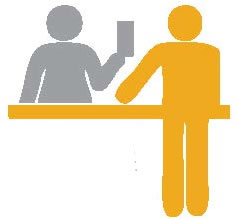 While giving the SONA update, President Zuma also announced the establishment of an Inter-Ministerial Committee (IMC) on Immigration Regulations, following concerns raised about the new visa regulations.
While giving the SONA update, President Zuma also announced the establishment of an Inter-Ministerial Committee (IMC) on Immigration Regulations, following concerns raised about the new visa regulations.
Under the new immigration legislation amendments, which came into effect in June, South Africans and foreign nationals travelling to and from South Africa with children under the age of 18 are required to produce unabridged birth certificates.
The new legislation is part of government’s commitment to safeguard the best interests of children and prevent child trafficking.
“The IMC will address the unintended consequences of the new immigration regulations on various sectors, including tourism and investment,” he said.
The IMC is chaired by Deputy President Cyril Ramaphosa and comprises the Ministers of Tourism, Home Affairs, Trade and Industry, Social Development and Small Business Development.
Water and Sanitation
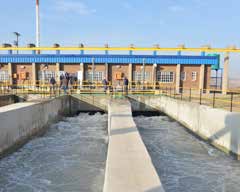 In an attempt to create more jobs and save water, the President said he would officially launch a programme, in Port Elizabeth, which seeks to train about 15 000 artisans and plumbers in the country.
In an attempt to create more jobs and save water, the President said he would officially launch a programme, in Port Elizabeth, which seeks to train about 15 000 artisans and plumbers in the country.
He said 3 000 trainees have made the list of first intakes recruited this financial year, and they would fix leaking taps in their communities.
The recruitment process will be done through the Department of Water and Sanitation. The President said this would stop the leaking of water which costs the country R7 billion a year.
“Government has identified water as a critical resource for economic development and work continues to implement the five point plan for water and sanitation,” he said.
The plan entails:
- Maintaining and upgrading existing water and sanitation infrastructure
- Building new dams and developing ground water
- Improving water quality
- Developing SMART technologies for water and sanitation information management; and
- Ensuring an enhanced and integrated regulatory regime, for example water use licensing.
“A review of both the Water Services and National Water Acts will be undertaken,” he said.
Education and health
Did you know?
The Department of Higher Education and Training currently runs a Career Development Services Centre to help learners with career advice. Learners can reach the Centre as follows:
SMS or “Please Call Me”: 072 204 5056;
e-mail: careerhelp@dhet.gov.za;
www.facebook.com/careerhelp
http://twitter.com/rsacareerhelp
Website: www.careerhelp.org.za
National Career Advice Portal: http://ncap.careerhelp.org.za
Walk-in Centre: 123 Francis Baard Street, Pretoria.
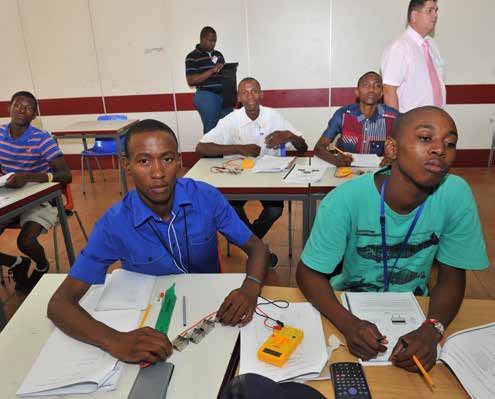 Meanwhile, President Zuma said the implementation of the Mathematics, Science and Technology Strategy would be strengthened in all schools.
Meanwhile, President Zuma said the implementation of the Mathematics, Science and Technology Strategy would be strengthened in all schools.
This following the 2014 Annual National Assessments (ANA) results, which indicated that Grade 3 targets in both literacy and numeracy have been exceeded, including Grade 6 Home Language, but performance in Grade 6 and 9 Maths and First Additional Language was below par.
“We welcome these positive developments and thank parents for cooperation which enables us to register progress as government,” said the President.
He added that government would also ensure improved teacher supply, training and development.
“The improvement of the qualifications of Grade R practitioners is also ongoing as part of the long-term investments in quality education,” said the President.
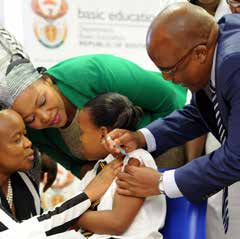 On the health front, President Zuma said South Africa has been praised by the United Nations AIDS programme (UNAIDS) for its successful response to HIV and AIDS.
On the health front, President Zuma said South Africa has been praised by the United Nations AIDS programme (UNAIDS) for its successful response to HIV and AIDS.
“Among the achievements, access to anti-retroviral treatment for people living with HIV and AIDS was expanded. To date, 3.1 million people are receiving treatment. This has exceeded the 2014/15 target of 3 million.
“The screening for Tuberculosis (TB) has been expanded, with 15.2 million people reached, which exceeded the target of 6 million.
“We thank all South Africans for their cooperation which is enabling the country to achieve a turnaround on HIV and Aids and to improve our response to TB,” the President said.
Debts due to municipalities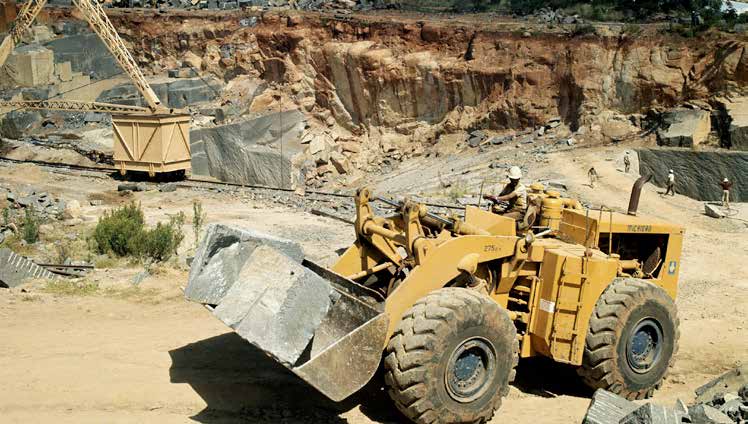
He urged government entities and the private sector to pay their debts to enable municipalities to function effectively.
To date, debt owed to municipalities is close to R100 billion, which is almost double the amount since 2009, the President noted.
He said while municipalities had been directed to pay their debts, debt owed to municipalities was not given sufficient attention.
Did you know?
The Operation Phakisa Mining Lab will identify a set of concrete problems that are limiting the growth and developmental impact of the sector.
The Mining Lab will also collaboratively develop plans to overcome these
challenges. A four-week Mining Lab is scheduled for October 2015.